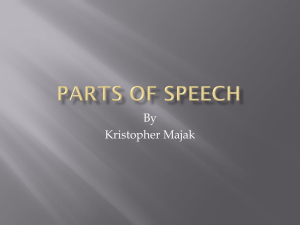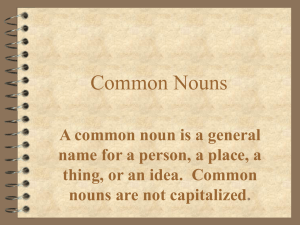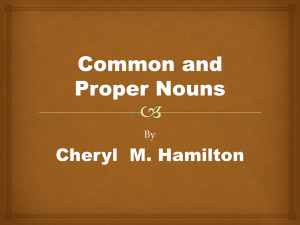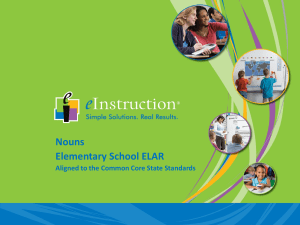ppt
advertisement
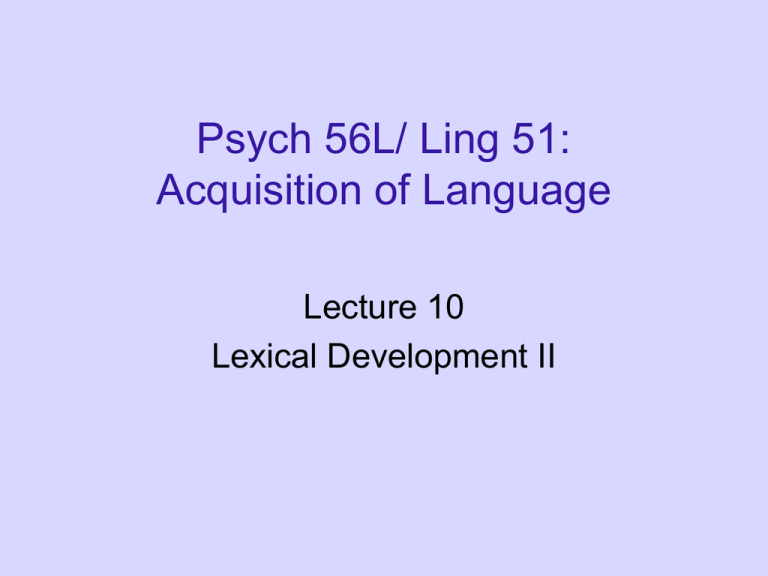
Psych 56L/ Ling 51: Acquisition of Language Lecture 10 Lexical Development II Announcements Pick up HW1 if you haven’t done so already Be working on review questions for lexical development HW2 due 2/23/12 The Course of Early Lexical Development First Words 10-15 months: first words that actually sound like the words the child is trying to approximate (and they have a fixed meaning, as opposed to being sound sequences the child likes to say) These tend to be context-bound: ex: “car” said when looking at cars out of apartment window, but not when looking at cars up close or when seeing a picture of a car Children’s usage: have simply identified one particular event in the context of which it’s appropriate to use that word, but haven’t realized its more abstract coverage First Words First words video & why might these words be learned earlier http://www.ted.com/talks/deb_roy_the_birth_of_a_word.html (~5:45 through ~11:00 of 19:52) QuickTime™ and a decompressor are needed to see this picture. First Words Even if children realize a word has more extended use, they still may not realize it has the meaning that adults have for it Ex: “more” = request for more, not general comparison Often, first words are parts of routines or language games. Children must then realize that these words can be extended. kitty First Words Even if children realize a word has more extended use, they still may not realize it has the meaning that adults have for it Ex: “more” = request for more, not general comparison Often, first words are parts of routines or language games. Children must then realize that these words can be extended. kitty First Words The extension process doesn’t happen at the same time for all words. Some referential words may coexist with words that are contextual. Which words are which will vary from child to child. Jacqui: “no” = context-bound, used when refusing something offered by her mother (wouldn’t say it when offered by someone else or while indicating her dislike of something, etc.) no First Words The extension process doesn’t happen at the same time for all words. Some referential words may coexist with words that are contextual. Which words are which will vary from child to child. Jenny: “no” = referential, used when pushing a drink away, while crawling to a step she was not allowed to climb, while refusing a request by her mother no First Words In general, it’s not because children don’t hear these words in different contexts that they have a narrower meaning than adults do. Their parents used the words in many different contexts. So what’s the problem? It’s not an easy task to extract the common meaning from different contexts. kitty = ? First Words In general, it’s not because children don’t hear these words in different contexts that they have a narrower meaning than adults do. Their parents used the words in many different contexts. So what’s the problem? It’s not an easy task to extract the common meaning from different contexts. cute = ? From 0 to 50 words Vocabularies of children with 50 or less words are heavily concentrated on experiences child has: names for people, food, body parts, clothing, animals, household items. (In general, a lot of nouns = noun bias) Adult and older children have more variety, including more abstract nouns, as well as other grammatical categories like prepositions (with, from), determiners (the, a), and adjectives (silly). The Preponderance of Nouns One idea: the meaning of nouns is easier to identify than the meaning of other words, like verbs kitty = ? give = ? The Preponderance of Nouns How do we test if it’s true that the meaning of nouns is easier to learn from observation than the meaning of verbs? Snedeker, Gleitman, & Brent (1999) asked adult speakers (who are presumably “cognitively mature”) to view scenes of what mothers are saying to their children and see which words they could learn. Experiment with English Speakers Snedeker, Gleitman, and Brent (1999) Stimuli preparation 1.Videotape English speaking mothers playing with their 18- to 24-month-old children 2. Transcribe video tape for mothers’ 24 most frequent nouns and 24 most frequent verbs. 3. For each of the most frequent words, randomly select 6 uses of the word. 4. Edit each instance for 40 second clips. Audio was removed and a beep is sounded at instant word uttered. Subject’s Task: Identify the “mystery word” represented by the beep. watch clip #1 Guess word. watch clip #2 Guess word again. watch clip #3 Guess word again. watch clip #4 Guess word again. watch clip #5 Guess word again. watch clip #6 Guess word again. Final Guess On to Next Mystery Word Percent Correct Identification in English Percentage of Correct Identification Snedeker, Gleitman, and Brent (1999) 35% 30% Noun Verb 25% 20% 15% 10% 5% 0% English Nouns seem to be easier Learning Verb Meaning Example of linguistic variation in verb meaning: English: The goblin fell into the river and then floated down it. Spanish: The goblin entered the river falling and then went down it floating. Learning Verb Meaning Example of linguistic variation in verb meaning: English: The goblin fell into the river and then floated down it. Go + Fall In Go + In Go + Float Fall Down Go Down Float Spanish: The goblin entered the river falling and then went down it floating. Learning Verb Meaning Example of linguistic variation in verb meaning: English: The goblin fell into the river and then floated down it. Go + Fall In Go + Float Down Manner of Motion encoded in verb Direction of Motion encoded in verb Go + In Fall Go Down Float Spanish: The goblin entered the river falling and then went down it floating. Also… There is some crosslinguistic variation in the preference for nouns over verbs in the early lexicon. Korean, Japanese, and Mandarin children show less of a noun bias. These languages have several ways of making verb information more salient to learners: verbs appearing sentence-final (very prominent for children), nouns optionally omitted How might verbs be learned? Proposal for vocabulary development (Snedeker & Gleitman 2002): 1. Learn from Scenes – Child relies on situational context alone – Can learn only very concrete words: object labels How might verbs be learned? Proposal for vocabulary development (Snedeker & Gleitman 2002): 1. Learn from Scenes 2. Learn from Nouns – Object labels provide richer representation of linguistic context – Utterance = set of known nouns – Child can learn concrete relational words like spatial prepositions (ex: “near”) and many verbs How might verbs be learned? Proposal for vocabulary development (Snedeker & Gleitman 2002): 1. Learn from Scenes 2. Learn from Nouns 3. Learn from Syntactic Frames – Learning relational words allows the child to learn the basic grammar of her language – Utterance is represented as a syntactic structure + known words – This representation allows the child to learn more abstract words Snedeker & Gleitman (2002) Targets – Videotaped interactions of 4 mother-child pairs – 24 most common verbs chosen as targets – for each target 6 instances randomly selected Subjects participated in one of 7 Information Conditions – – – – – – – Scenes Nouns Frames Scenes + Nouns Scenes + Frames Nouns + Frames Scenes + Nouns + Frames Scenes Condition Example “mystery verb”: “play” beep Guess Word. Task: Subjects guess mystery verb from watching 6 instances of word use in video clips. The video clips are silent except beeps replace the moments the mystery word were uttered. beep Guess Word Again. Etc…. Final Guess On to Next Mystery Verb Nouns Condition Example “mystery verb”: “play” 1. elephant, piano Guess Word. 2. mommy Guess Word Again. 3. I, it, you Guess Word Again. 4. it, you Task: Subjects shown the Guess Word Again. nouns co-occurring with 5. drums the mystery verb in 6 sentences, the same sentences as those in the video clips with the beeps. Guess Word Again. 6. music, you Final Guess On to Next Mystery Verb Frames Condition Example “mystery verb”: “play” 1. Can kax SIRN the bussit? Guess Word. 2. Noggle SIRN? Guess Word Again. 3. Can po SIRN while lo nirp nu? Guess Word Again. 4. Lo are gonna SIRN nu? Task: Subjects guess the Guess Word Again. mystery verb from the 6 5. SIRN the neps. sentence frames. The sentence frames are constructed by replacing words in the 6 utterances with nonsense words. Guess Word Again. 6. Lo SIRN tuggy wilm. Final Guess On to Next Mystery Verb % Correct on Final Trial 90% Correct Identification Varies with Information Condition 80% 70% 60% p < .05 (significant) 50% Frames 40% 30% Nouns 20% 10% 0% Scenes % Correct on Final Trial 90% Correct Identification Varies with Information Condition p < .05 80% 70% 60% 50% 40% p < .05 Scenes+Nouns 30% Scenes 20% 10% 0% Full Info % Correct on Final Trial 90% Correct Identification Varies with Information Condition p < .05 Full Info Scenes Nouns + + Frames Frames 80% 70% 60% 50% 40% Scenes p < .05 + Nouns Frames p < .05 30% 20% 10% 0% Nouns Scenes Utility of syntactic frame knowledge: Scenes + Nouns equivalent to Syntactic Frames only % Correct on Final Trial 90% p < .05 Full Info Scenes Nouns + + Frames Frames 80% 70% 60% 50% 40% Scenes p < .05 + Nouns Frames p < .05 30% 20% 10% 0% Nouns Scenes Utility of additional knowledge with Frames: Scenes + Frames equivalent to Nouns + Frames, which is better than Frames alone % Correct on Final Trial 90% p < .05 Full Info Scenes Nouns + + Frames Frames 80% 70% 60% 50% 40% Scenes p < .05 + Nouns Frames p < .05 30% 20% 10% 0% Nouns Scenes Superiority of using all the available information: Scenes + Nouns + Frames is better than all other information type combinations % Correct on Final Trial 90% p < .05 Full Info Scenes Nouns + + Frames Frames 80% 70% 60% 50% 40% Scenes p < .05 + Nouns Frames p < .05 30% 20% 10% 0% Nouns Scenes So Snedeker & Gleitman (2002) have shown that maybe learning verbs isn’t so bad once you have some linguistic background (like knowing some nouns and some syntactic frames) and informative situational context (scenes)… Now, back to learning nouns (a first step)… Common mistakes children make with meaning Once children figure out that words are referential, they have to figure out what range of concepts words apply to. This isn’t so easy. Underextension: using words in a narrower range. Ex: Only siamese and persian cats are cats. kitty Not kitty Common mistakes children make with meaning Once children figure out that words are referential, they have to figure out what range of concepts words apply to. This isn’t so easy. Overextension: using words in a wider range. (more common) Ex: All fuzzy creatures are cats. kitty Not kitty Causes of extension errors Underextension: perhaps child is conservatively extending hypothesis about what word refers to; correctable from experience with word’s usage by adults Overextension: Likely to simply be because child doesn’t know appropriate word and uses one that’s known. Overextensions tend to have some aspect of meaning in common, though. Corrected as children learn appropriate words for meanings they want to express. Some more overextension examples Ball = ball, balloon, marble, apple, egg, wool pom-pom, spherical water tank common feature = “round-ish shape” Cat = cat, cat’s usual location on top of tv when absent common feature = “associated with kitty” Some more overextension examples Ball = ball, balloon, marble, apple, egg, wool pom-pom, spherical water tank common feature = “round-ish shape” Cat = cat, cat’s usual location on top of tv when absent common feature = “associated with kitty” Moon = moon, half-moon-shaped lemon slice, circular chrome dial on dishwasher, ball of spinach, wall hanging with pink and purple circles, half a Cheerio, hangnail common feature = “crescent or round-ish shape” + a memory retrieval error? A Little Later Lexical Development The difference after 50 words Up to 50 words: about 8-11 words added every month, adding words is a slow process After 50 words: about 22-37 words added every month, words often added after a single exposure Called the “word spurt”, “word explosion”, “naming explosion”. Occurs for most (but not all) children around 18 months. Does every child have a word spurt? Some seem to (13 of 18) Goldfield & Reznick (1990) Does every child have a word spurt? Others don’t (5 of 18) Goldfield & Reznick (1990) Word Comprehension The word spurt refers to words children actually produce. However, another way to test children’s developing lexicons is via their comprehension of words. Production usually lags behind comprehension. Ex: At 16 months, children typically produce less than 50 words, but parents report they comprehend between 92 and 321 words. Production vocabularies are different from comprehension vocabularies. (This may be because communication works just fine with a minimal verb vocabulary. Ex: go is very versatile. Go + night-night, go + car, go + park, etc.) How learning works: Links between phonology and word-learning phonological memory = ability to remember a sequence of unfamiliar sounds Children’s phonological memory has been linked to their vocabulary size from 22 months up to 9 years old. (This makes sense since the ability to remember the forms of newly encountered words would be vital if a child wants to learn the mapping between sound and meaning.) Recap: Children’s Lexical Development Children must figure out the lexicon of their language, including the correspondence between sounds and meaning Children typically acquire their first 50 words over a series of months, and then increase their rate of lexical acquisition suddenly (word spurt) Learning word meanings isn’t easy: - some kinds of words may be more difficult to learn than others (nouns vs. verbs) - often, children make mistakes by either assigning a narrower or wider meaning to a word than adults do. Eventually, through experience with the language, they home in on the correct meaning. Questions? You should be able to do all the questions on HW2, and up through question 13 on the lexical development review questions.
